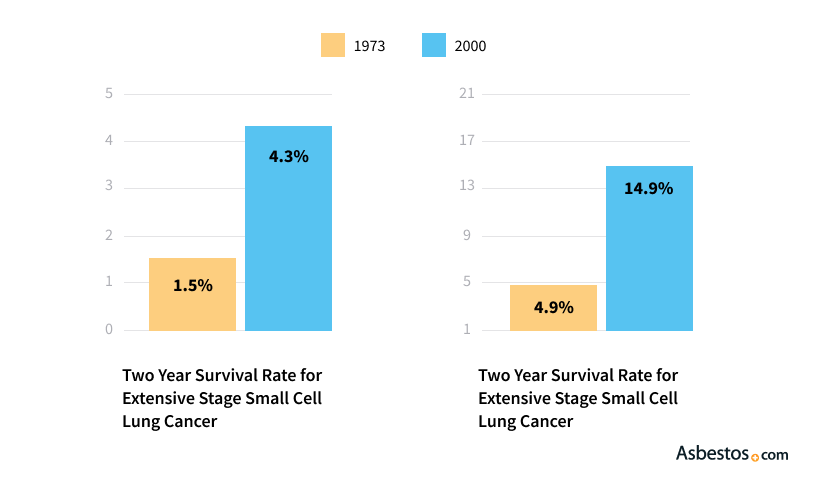Get in Touch
Have questions? Call or chat with our Patient Advocates for answers.
Average asbestos-related lung cancer life expectancy is 16.2 months. An asbestos-related lung cancer prognosis is best determined by a lung cancer specialist. You may be able to improve your prognosis through treatments such as surgery, chemotherapy and immunotherapy.

Written by Suzanne Dixon, MPH, MS, RDN | Medically Reviewed By Dr. Andrea Wolf | Edited By Walter Pacheco | Last Update: June 27, 2024
Patients with asbestos-related lung cancer face a similar prognosis as other lung cancer patients.
In a 2009 Japanese study, the average prognosis for asbestos-related lung cancer was 16.2 months, while the average prognosis for non-asbestos related lung cancer was 17.2 months. Of the patients with asbestos-related lung cancer, 25% achieved a five-year survival rate with treatment. Exposure to asbestos was not found to substantially increase or reduce a lung cancer patient’s prognosis.
As with other asbestos-related diseases, such as mesothelioma, early diagnosis helps patients qualify for more effective treatment options that improve survival.
Asbestos-related diseases develop slowly and are often diagnosed in their later stages, preventing many patients from eligibility for surgery and other effective lung cancer treatment options.
Patients who have been heavily exposed to asbestos — especially those with a history of smoking cigarettes — should consider yearly lung cancer screenings to catch tumors before they become inoperable.
Lung cancer screening involves a low-dose CT scan, which can show tumors growing at early stages. Research published in 2017 shows workers with a history of asbestos exposure may also benefit from regular spirometry tests, which can identify workers with weakened lung function who may be at risk of developing lung cancer.
However, your prognosis is not a fixed number. You may be able to improve your life expectancy through treatment, which mesothelioma and lung cancer patients share in common.
Tumor-removing surgery, chemotherapy, radiation therapy and immunotherapy all can play a role in someone living longer with asbestos-related cancer.
A 2022 report in the Journal of Cellular and Molecular medicine suggested measuring lymphocyte involvement as a predictor of prognosis.
Some prognostic factors are positive, meaning they will tend to increase the length of your life, while others negatively impact your prognosis. Patients can have a combination of poor and positive prognostic factors.
| Positive Prognostic Factors | Poor Prognostic Factors |
|---|---|
| Under age 65 | Age 65 or older |
| Female | Male |
| Nonsmoker | Smoker |
| High hemoglobin levels | Stage 3 or stage 4 cancer |
| Normal lactate dehydrogenase levels | Cancerous spread to other organs |

Get help paying for treatment and other expenses by accessing trust funds, grants and other options.
See if You QualifyThe cancer’s stage is one of the primary factors when determining a patient’s prognosis.
Overall, lung cancer patients who are diagnosed at an early stage tend to have a better prognosis and longer survival rate.
The two main types of lung cancer, small cell and non-small cell, are associated with different survival rates. Notably, small cell survival is significantly shorter than non-small cell.
Even non-small cell has cell subtypes with different prognoses. For example, adenocarcinoma is a type of non-small cell, and it tends to have a slightly better prognosis than other forms.
A 2011 study reported that adenocarcinoma patients lived a median of 8.4 months while all other non-small cell lung cancer patients lived a median of 8.1 months. While the difference is small, researchers have found similar results in other studies and believe the lung cancer statistics are significant.

Asbestos exposure is not a significant prognostic factor for lung cancer patients.
Patients with asbestos-related lung cancer have similar prognoses as patients with lung cancer caused by another carcinogen such as cigarette smoke.
While prognostic factors and survival statistics are identified through studies and scientific analysis, they can’t account for personal factors. Some patients outlive their prognosis without any significant explanation, while others live longer thanks to aggressive treatment or participation in clinical trials that gave them access to groundbreaking therapies such as immunotherapy.
Recommended ReadingThank you for your feedback. Would you like to speak with a Patient Advocate?
Your web browser is no longer supported by Microsoft. Update your browser for more security, speed and compatibility.
If you are looking for mesothelioma support, please contact our Patient Advocates at (855) 404-4592
The Mesothelioma Center at Asbestos.com has provided patients and their loved ones the most updated and reliable information on mesothelioma and asbestos exposure since 2006.
Our team of Patient Advocates includes a medical doctor, a registered nurse, health services administrators, veterans, VA-accredited Claims Agents, an oncology patient navigator and hospice care expert. Their combined expertise means we help any mesothelioma patient or loved one through every step of their cancer journey.
More than 30 contributors, including mesothelioma doctors, survivors, health care professionals and other experts, have peer-reviewed our website and written unique research-driven articles to ensure you get the highest-quality medical and health information.
My family has only the highest compliment for the assistance and support that we received from The Mesothelioma Center. This is a staff of compassionate and knowledgeable individuals who respect what your family is experiencing and who go the extra mile to make an unfortunate diagnosis less stressful. Information and assistance were provided by The Mesothelioma Center at no cost to our family.LashawnMesothelioma patient’s daughter


Dixon, S. (2024, June 27). Asbestos-Related Lung Cancer Prognosis. Asbestos.com. Retrieved July 26, 2024, from https://www.asbestos.com/cancer/lung-cancer/prognosis/
Dixon, Suzanne. "Asbestos-Related Lung Cancer Prognosis." Asbestos.com, 27 Jun 2024, https://www.asbestos.com/cancer/lung-cancer/prognosis/.
Dixon, Suzanne. "Asbestos-Related Lung Cancer Prognosis." Asbestos.com. Last modified June 27, 2024. https://www.asbestos.com/cancer/lung-cancer/prognosis/.
The Mesothelioma Center at Asbestos.com has provided patients and their loved ones the most updated and reliable information on mesothelioma and asbestos exposure since 2006.
Our team of Patient Advocates includes a medical doctor, a registered nurse, health services administrators, veterans, VA-accredited Claims Agents, an oncology patient navigator and hospice care expert. Their combined expertise means we help any mesothelioma patient or loved one through every step of their cancer journey.
More than 30 contributors, including mesothelioma doctors, survivors, health care professionals and other experts, have peer-reviewed our website and written unique research-driven articles to ensure you get the highest-quality medical and health information.
My family has only the highest compliment for the assistance and support that we received from The Mesothelioma Center. This is a staff of compassionate and knowledgeable individuals who respect what your family is experiencing and who go the extra mile to make an unfortunate diagnosis less stressful. Information and assistance were provided by The Mesothelioma Center at no cost to our family.LashawnMesothelioma patient’s daughter


Dixon, S. (2024, June 27). Asbestos-Related Lung Cancer Prognosis. Asbestos.com. Retrieved July 26, 2024, from https://www.asbestos.com/cancer/lung-cancer/prognosis/
Dixon, Suzanne. "Asbestos-Related Lung Cancer Prognosis." Asbestos.com, 27 Jun 2024, https://www.asbestos.com/cancer/lung-cancer/prognosis/.
Dixon, Suzanne. "Asbestos-Related Lung Cancer Prognosis." Asbestos.com. Last modified June 27, 2024. https://www.asbestos.com/cancer/lung-cancer/prognosis/.
The Mesothelioma Center at Asbestos.com has provided patients and their loved ones the most updated and reliable information on mesothelioma and asbestos exposure since 2006.
Our team of Patient Advocates includes a medical doctor, a registered nurse, health services administrators, veterans, VA-accredited Claims Agents, an oncology patient navigator and hospice care expert. Their combined expertise means we help any mesothelioma patient or loved one through every step of their cancer journey.
More than 30 contributors, including mesothelioma doctors, survivors, health care professionals and other experts, have peer-reviewed our website and written unique research-driven articles to ensure you get the highest-quality medical and health information.
My family has only the highest compliment for the assistance and support that we received from The Mesothelioma Center. This is a staff of compassionate and knowledgeable individuals who respect what your family is experiencing and who go the extra mile to make an unfortunate diagnosis less stressful. Information and assistance were provided by The Mesothelioma Center at no cost to our family.LashawnMesothelioma patient’s daughter


Dixon, S. (2024, June 27). Asbestos-Related Lung Cancer Prognosis. Asbestos.com. Retrieved July 26, 2024, from https://www.asbestos.com/cancer/lung-cancer/prognosis/
Dixon, Suzanne. "Asbestos-Related Lung Cancer Prognosis." Asbestos.com, 27 Jun 2024, https://www.asbestos.com/cancer/lung-cancer/prognosis/.
Dixon, Suzanne. "Asbestos-Related Lung Cancer Prognosis." Asbestos.com. Last modified June 27, 2024. https://www.asbestos.com/cancer/lung-cancer/prognosis/.
The Mesothelioma Center at Asbestos.com has provided patients and their loved ones the most updated and reliable information on mesothelioma and asbestos exposure since 2006.
Our team of Patient Advocates includes a medical doctor, a registered nurse, health services administrators, veterans, VA-accredited Claims Agents, an oncology patient navigator and hospice care expert. Their combined expertise means we help any mesothelioma patient or loved one through every step of their cancer journey.
More than 30 contributors, including mesothelioma doctors, survivors, health care professionals and other experts, have peer-reviewed our website and written unique research-driven articles to ensure you get the highest-quality medical and health information.
My family has only the highest compliment for the assistance and support that we received from The Mesothelioma Center. This is a staff of compassionate and knowledgeable individuals who respect what your family is experiencing and who go the extra mile to make an unfortunate diagnosis less stressful. Information and assistance were provided by The Mesothelioma Center at no cost to our family.LashawnMesothelioma patient’s daughter


Dixon, S. (2024, June 27). Asbestos-Related Lung Cancer Prognosis. Asbestos.com. Retrieved July 26, 2024, from https://www.asbestos.com/cancer/lung-cancer/prognosis/
Dixon, Suzanne. "Asbestos-Related Lung Cancer Prognosis." Asbestos.com, 27 Jun 2024, https://www.asbestos.com/cancer/lung-cancer/prognosis/.
Dixon, Suzanne. "Asbestos-Related Lung Cancer Prognosis." Asbestos.com. Last modified June 27, 2024. https://www.asbestos.com/cancer/lung-cancer/prognosis/.
The Mesothelioma Center at Asbestos.com has provided patients and their loved ones the most updated and reliable information on mesothelioma and asbestos exposure since 2006.
Our team of Patient Advocates includes a medical doctor, a registered nurse, health services administrators, veterans, VA-accredited Claims Agents, an oncology patient navigator and hospice care expert. Their combined expertise means we help any mesothelioma patient or loved one through every step of their cancer journey.
More than 30 contributors, including mesothelioma doctors, survivors, health care professionals and other experts, have peer-reviewed our website and written unique research-driven articles to ensure you get the highest-quality medical and health information.
My family has only the highest compliment for the assistance and support that we received from The Mesothelioma Center. This is a staff of compassionate and knowledgeable individuals who respect what your family is experiencing and who go the extra mile to make an unfortunate diagnosis less stressful. Information and assistance were provided by The Mesothelioma Center at no cost to our family.LashawnMesothelioma patient’s daughter


Dixon, S. (2024, June 27). Asbestos-Related Lung Cancer Prognosis. Asbestos.com. Retrieved July 26, 2024, from https://www.asbestos.com/cancer/lung-cancer/prognosis/
Dixon, Suzanne. "Asbestos-Related Lung Cancer Prognosis." Asbestos.com, 27 Jun 2024, https://www.asbestos.com/cancer/lung-cancer/prognosis/.
Dixon, Suzanne. "Asbestos-Related Lung Cancer Prognosis." Asbestos.com. Last modified June 27, 2024. https://www.asbestos.com/cancer/lung-cancer/prognosis/.
The Mesothelioma Center at Asbestos.com has provided patients and their loved ones the most updated and reliable information on mesothelioma and asbestos exposure since 2006.
Our team of Patient Advocates includes a medical doctor, a registered nurse, health services administrators, veterans, VA-accredited Claims Agents, an oncology patient navigator and hospice care expert. Their combined expertise means we help any mesothelioma patient or loved one through every step of their cancer journey.
More than 30 contributors, including mesothelioma doctors, survivors, health care professionals and other experts, have peer-reviewed our website and written unique research-driven articles to ensure you get the highest-quality medical and health information.
My family has only the highest compliment for the assistance and support that we received from The Mesothelioma Center. This is a staff of compassionate and knowledgeable individuals who respect what your family is experiencing and who go the extra mile to make an unfortunate diagnosis less stressful. Information and assistance were provided by The Mesothelioma Center at no cost to our family.LashawnMesothelioma patient’s daughter


Dixon, S. (2024, June 27). Asbestos-Related Lung Cancer Prognosis. Asbestos.com. Retrieved July 26, 2024, from https://www.asbestos.com/cancer/lung-cancer/prognosis/
Dixon, Suzanne. "Asbestos-Related Lung Cancer Prognosis." Asbestos.com, 27 Jun 2024, https://www.asbestos.com/cancer/lung-cancer/prognosis/.
Dixon, Suzanne. "Asbestos-Related Lung Cancer Prognosis." Asbestos.com. Last modified June 27, 2024. https://www.asbestos.com/cancer/lung-cancer/prognosis/.
The Mesothelioma Center at Asbestos.com has provided patients and their loved ones the most updated and reliable information on mesothelioma and asbestos exposure since 2006.
Our team of Patient Advocates includes a medical doctor, a registered nurse, health services administrators, veterans, VA-accredited Claims Agents, an oncology patient navigator and hospice care expert. Their combined expertise means we help any mesothelioma patient or loved one through every step of their cancer journey.
More than 30 contributors, including mesothelioma doctors, survivors, health care professionals and other experts, have peer-reviewed our website and written unique research-driven articles to ensure you get the highest-quality medical and health information.
My family has only the highest compliment for the assistance and support that we received from The Mesothelioma Center. This is a staff of compassionate and knowledgeable individuals who respect what your family is experiencing and who go the extra mile to make an unfortunate diagnosis less stressful. Information and assistance were provided by The Mesothelioma Center at no cost to our family.LashawnMesothelioma patient’s daughter


Dixon, S. (2024, June 27). Asbestos-Related Lung Cancer Prognosis. Asbestos.com. Retrieved July 26, 2024, from https://www.asbestos.com/cancer/lung-cancer/prognosis/
Dixon, Suzanne. "Asbestos-Related Lung Cancer Prognosis." Asbestos.com, 27 Jun 2024, https://www.asbestos.com/cancer/lung-cancer/prognosis/.
Dixon, Suzanne. "Asbestos-Related Lung Cancer Prognosis." Asbestos.com. Last modified June 27, 2024. https://www.asbestos.com/cancer/lung-cancer/prognosis/.
The Mesothelioma Center at Asbestos.com has provided patients and their loved ones the most updated and reliable information on mesothelioma and asbestos exposure since 2006.
Our team of Patient Advocates includes a medical doctor, a registered nurse, health services administrators, veterans, VA-accredited Claims Agents, an oncology patient navigator and hospice care expert. Their combined expertise means we help any mesothelioma patient or loved one through every step of their cancer journey.
More than 30 contributors, including mesothelioma doctors, survivors, health care professionals and other experts, have peer-reviewed our website and written unique research-driven articles to ensure you get the highest-quality medical and health information.
My family has only the highest compliment for the assistance and support that we received from The Mesothelioma Center. This is a staff of compassionate and knowledgeable individuals who respect what your family is experiencing and who go the extra mile to make an unfortunate diagnosis less stressful. Information and assistance were provided by The Mesothelioma Center at no cost to our family.LashawnMesothelioma patient’s daughter


Dixon, S. (2024, June 27). Asbestos-Related Lung Cancer Prognosis. Asbestos.com. Retrieved July 26, 2024, from https://www.asbestos.com/cancer/lung-cancer/prognosis/
Dixon, Suzanne. "Asbestos-Related Lung Cancer Prognosis." Asbestos.com, 27 Jun 2024, https://www.asbestos.com/cancer/lung-cancer/prognosis/.
Dixon, Suzanne. "Asbestos-Related Lung Cancer Prognosis." Asbestos.com. Last modified June 27, 2024. https://www.asbestos.com/cancer/lung-cancer/prognosis/.
The Mesothelioma Center at Asbestos.com has provided patients and their loved ones the most updated and reliable information on mesothelioma and asbestos exposure since 2006.
Our team of Patient Advocates includes a medical doctor, a registered nurse, health services administrators, veterans, VA-accredited Claims Agents, an oncology patient navigator and hospice care expert. Their combined expertise means we help any mesothelioma patient or loved one through every step of their cancer journey.
More than 30 contributors, including mesothelioma doctors, survivors, health care professionals and other experts, have peer-reviewed our website and written unique research-driven articles to ensure you get the highest-quality medical and health information.
My family has only the highest compliment for the assistance and support that we received from The Mesothelioma Center. This is a staff of compassionate and knowledgeable individuals who respect what your family is experiencing and who go the extra mile to make an unfortunate diagnosis less stressful. Information and assistance were provided by The Mesothelioma Center at no cost to our family.LashawnMesothelioma patient’s daughter


Dixon, S. (2024, June 27). Asbestos-Related Lung Cancer Prognosis. Asbestos.com. Retrieved July 26, 2024, from https://www.asbestos.com/cancer/lung-cancer/prognosis/
Dixon, Suzanne. "Asbestos-Related Lung Cancer Prognosis." Asbestos.com, 27 Jun 2024, https://www.asbestos.com/cancer/lung-cancer/prognosis/.
Dixon, Suzanne. "Asbestos-Related Lung Cancer Prognosis." Asbestos.com. Last modified June 27, 2024. https://www.asbestos.com/cancer/lung-cancer/prognosis/.
The Mesothelioma Center at Asbestos.com has provided patients and their loved ones the most updated and reliable information on mesothelioma and asbestos exposure since 2006.
Our team of Patient Advocates includes a medical doctor, a registered nurse, health services administrators, veterans, VA-accredited Claims Agents, an oncology patient navigator and hospice care expert. Their combined expertise means we help any mesothelioma patient or loved one through every step of their cancer journey.
More than 30 contributors, including mesothelioma doctors, survivors, health care professionals and other experts, have peer-reviewed our website and written unique research-driven articles to ensure you get the highest-quality medical and health information.
My family has only the highest compliment for the assistance and support that we received from The Mesothelioma Center. This is a staff of compassionate and knowledgeable individuals who respect what your family is experiencing and who go the extra mile to make an unfortunate diagnosis less stressful. Information and assistance were provided by The Mesothelioma Center at no cost to our family.LashawnMesothelioma patient’s daughter


Dixon, S. (2024, June 27). Asbestos-Related Lung Cancer Prognosis. Asbestos.com. Retrieved July 26, 2024, from https://www.asbestos.com/cancer/lung-cancer/prognosis/
Dixon, Suzanne. "Asbestos-Related Lung Cancer Prognosis." Asbestos.com, 27 Jun 2024, https://www.asbestos.com/cancer/lung-cancer/prognosis/.
Dixon, Suzanne. "Asbestos-Related Lung Cancer Prognosis." Asbestos.com. Last modified June 27, 2024. https://www.asbestos.com/cancer/lung-cancer/prognosis/.
A medical doctor who specializes in mesothelioma or cancer treatment reviewed the content on this page to ensure it meets current medical standards and accuracy.
Please read our editorial guidelines to learn more about our content creation and review process.
Dr. Andrea Wolf is the Director of the New York Mesothelioma Program at Mount Sinai in New York City. She focuses on multidisciplinary treatment, clinical research, community outreach and education.
A medical doctor who specializes in mesothelioma or cancer treatment reviewed the content on this page to ensure it meets current medical standards and accuracy.
Please read our editorial guidelines to learn more about our content creation and review process.
Dr. Andrea Wolf is the Director of the New York Mesothelioma Program at Mount Sinai in New York City. She focuses on multidisciplinary treatment, clinical research, community outreach and education.
Mesothelioma Center - Vital Services for Cancer Patients & Families doesn’t believe in selling customer information. However, as required by the new California Consumer Privacy Act (CCPA), you may record your preference to view or remove your personal information by completing the form below.
